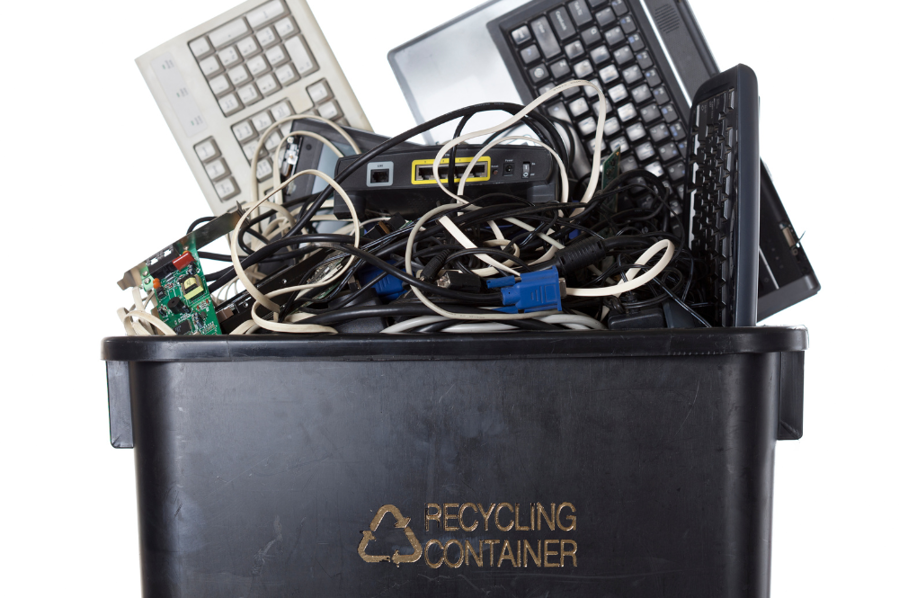In a world where new tech is always around the corner, it’s easy to end up with a growing pile of old electronics, laptops that no longer boot up, phones gathering dust in drawers, or printers that have seen better days. But tossing them in the trash isn’t just wasteful, it can also be harmful. When electronics are discarded improperly, they often become e-waste, contributing to pollution and draining valuable resources.
At HCI Environmental, we believe responsible electronics disposal shouldn’t feel complicated. It should be simple, safe, and better for the planet. Whether you’re cleaning out your home office or managing a facility with outdated equipment, we’re here to help you recycle smart. Let’s walk through how you can handle e-waste correctly, for your safety and the environment’s.
Why E-Waste Recycling Matters
Electronic waste contains valuable materials like gold, silver, copper, and aluminum, along with hazardous substances such as lead, mercury, and cadmium. When improperly disposed of, these toxic materials can leach into the soil and water, creating serious environmental and health risks.
By recycling electronics:
Toxic elements are safely removed and handled
Reusable materials are recovered and reintroduced into the supply chain
Landfill space is preserved
Greenhouse gas emissions are reduced through less energy-intensive resource extraction
In short, E-waste recycling benefits both the planet and the economy.
Step-by-Step Guide to Responsible Electronics Disposal
Whether you're cleaning out your home office or managing outdated equipment at work, here’s how to make sure your electronics are disposed of properly:
1. Take Inventory
Gather all outdated or non-functional electronics, including:
Computers and laptops
Phones and tablets
Printers and fax machines
Monitors and TVs
Batteries and cords
Don’t forget items that might be stored away and forgotten; if they plug in or run on batteries, they’re likely considered e-waste.
2. Wipe Personal Data
Before recycling, remove all personal and sensitive information from devices. This can include performing a factory reset, removing hard drives, or using certified data destruction services.
3. Check for Local Regulations
Depending on your state or region, electronic waste is subject to different disposal laws. Some devices require special handling, and others must be processed by certified facilities.
4. Use Certified E-Waste Recyclers
Choose facilities that follow environmental regulations and maintain certifications such as R2 (Responsible Recycling) or e-Stewards. HCI Environmental partners with reputable recycling providers, ensuring compliant, safe, and responsible disposal of electronics.
5. Schedule Pickup or Drop-off
Many businesses, schools, and municipalities offer drop-off events or bulk pickup options. For commercial or large-scale disposal, HCI Environmental offers convenient collection and transportation services tailored to your needs.
How HCI Environmental Supports Safe E-Waste Recycling
At HCI Environmental, we make it simple to take sustainability seriously. As an environmental services provider, we offer custom solutions for:
Electronics recycling and disposal
Hazardous waste identification and handling
Compliance with local, state, and federal regulations
Bulk pickup and transport logistics
Secure data destruction and reporting
Whether you’re a business upgrading your IT infrastructure or a facility managing high volumes of obsolete devices, our team ensures the safe, compliant, and eco-friendly disposal of all your electronic waste.
Take Action Today
Technology won’t stop advancing—and neither should your environmental practices. Now is the time to develop or refine your e-waste recycling program. Small changes in how we dispose of electronics can have a big impact on sustainability.
Contact HCI Environmental to schedule a consultation and learn how our expert team can help you implement responsible electronics disposal that meets environmental standards and supports your sustainability goals.
FAQs
What items are considered e-waste?
Any electronic item that is discarded, obsolete, or broken, including computers, phones, TVs, printers, and batteries, can be classified as e-waste.
Can I throw electronics in the trash?
No. Electronics often contain hazardous materials that can harm the environment. Many states prohibit the disposal of e-waste in landfills.
How do I make sure my data is safe before recycling?
You should wipe all devices using a secure data destruction method or consult a certified recycler who offers this service.
Does HCI Environmental offer e-waste pickup?
Yes. We offer scheduled pickups for commercial, educational, and industrial clients managing electronic waste.
Is electronic waste recycling regulated?
Yes. E-waste is regulated under various local, state, and federal guidelines to ensure safe handling and prevent environmental contamination.
 24/7 EMERGENCY CHEMICAL SPILL RESPONSE LIVE OPERATOR 800.988.4424
24/7 EMERGENCY CHEMICAL SPILL RESPONSE LIVE OPERATOR 800.988.4424 
